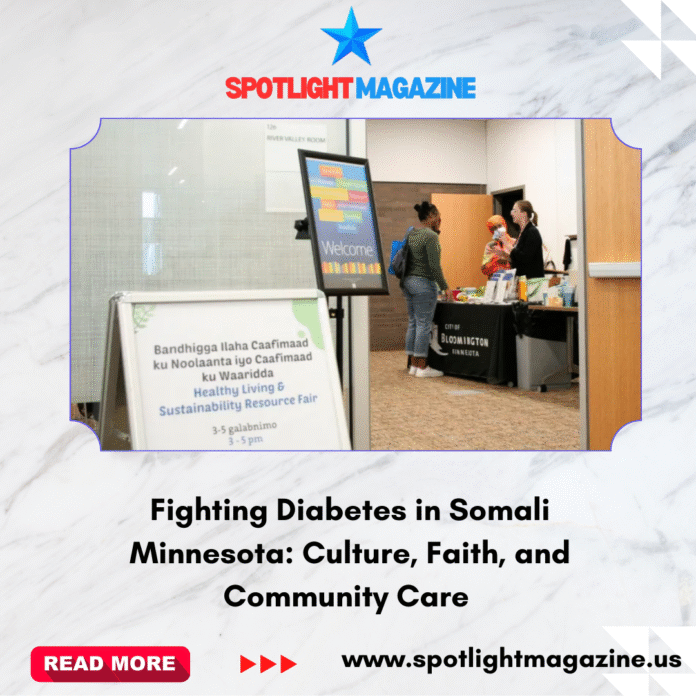Diabetes has become one of the most serious health problems facing many Americans, including Somali Minnesotans. For immigrants, managing the disease often means balancing cultural traditions, new dietary habits, and barriers to health care.
Omar Nur, executive director of the Somali American Social Service Association in Rochester, said many Somali families are unaware of their hereditary risks or the long-term nature of diabetes. Preventative education on diet and exercise is often missing, leaving families vulnerable.
Axis Medical Clinic in Minneapolis, which serves refugees and immigrants, has seen a steady rise in patients with diabetes since opening in 2008. Family physician Dr. Juan Lewis said dietary changes play a big role. In the U.S., highly processed, sugary foods are everywhere, while fresh produce can be harder to find.
This was true for Rageh Abdullah, who came to Minnesota at age 15. Like many teenagers, he turned to fast food for convenience, but his health began to suffer. By 2018, he was pre-diabetic. Instead of taking prescribed medication, he traveled to Kenya for a strict, sugar-free diet and lifestyle change. Two years later, doctors found he was no longer at risk for diabetes. His experience shows how lifestyle adjustments can make a difference.
To help others, Axis employs a Somali diabetes educator to guide patients in making traditional meals healthier. Other community organizations also step in. The Brian Coyle Center in Cedar-Riverside gives out free fruits and vegetables twice a month, and Isuroon’s Halal Food Assistance offers culturally appropriate food staples across the Twin Cities.

Religious practices also shape how diabetes is managed. Fasting during Ramadan, for example, can make structured eating difficult. Dr. Lewis encourages patients to keep healthy diets year-round while offering advice on portion control and carbohydrate reduction during fasting. Some, like Abdullah, say fasting helps them keep blood sugar low. But religious beliefs can also discourage preventative medicine, with some patients seeing illness and death as matters decided by God.
Beyond cultural and religious influences, Somali immigrants face barriers such as language differences, lack of culturally aware providers, and mistrust of medical advice. Some prefer listening to community members they know, even if those people lack medical training. Communication can also be difficult, since many Somalis speak but do not read the language, making translations less effective.
A 2015 Mayo Clinic study found Somali patients scored low on diabetes knowledge tests, but researchers said the main problem wasn’t literacy. Instead, larger social and structural barriers—like limited access to care and healthy food—play a bigger role. To address this, Rochester’s Healthy Community Partnership created a free digital storytelling program where Somali and Latino patients share their experiences with Type 2 diabetes.
Economic barriers add to the challenge. While many qualify for Medicaid, some necessary medications are not covered, and patients often don’t know how to navigate insurance denials. Without help, they may go without treatment. Programs like MNsure and Project Care provide free, language-specific assistance to help families understand coverage and access medication, including insulin support.
Cost also limits access to exercise. Nur said gym memberships can be over $150 per month, leaving many families without affordable fitness options. Community leaders encourage simple alternatives, such as walking outside or staying active at home.
Mobile health clinics are another important tool. The University of Minnesota’s Mobile Health Initiative brings screenings and care directly into Somali neighborhoods and mosques. These clinics help uncover hidden cases of diabetes and other conditions, often reaching dozens of people at each event. But organizers say limited funding makes it hard to expand services.
Despite these obstacles, Somali community leaders, clinics, and organizations continue working together to fight diabetes. From culturally tailored food support to free health screenings, they are finding creative ways to help families manage the disease and live healthier lives.


